Getting to the Party at Chuangwei Elementary School
The rest of our time at Chuanwei was exciting and interesting in finding ways to implement the game. We got set in our routine and made it through the rest of the week. The classes went great, and the kids really responded to WAYK, and in the end, so did the teachers.
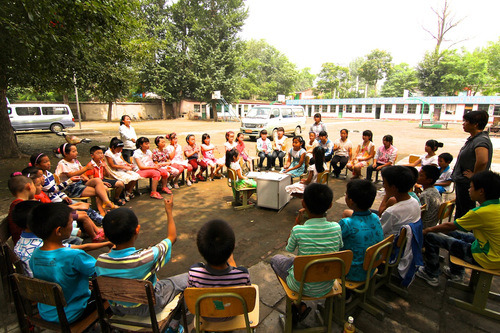
One of the problems that we ran into when we got there was that the teachers weren’t sold on the methodology. It wasn’t a surprise, as most people aren’t on this non-traditional method, but they were willing to hear us out. As David demonstrated the game over the course of the week, the teachers had all of the usual concerns; how to talk about abstract concepts, what do you do if you don’t have a hand sign, etc. Yet their biggest concern was that the students already knew the material we were covering, and that’s why they were responding so well to it to what we were covering in the language. The thing was, they weren’t responding that well. Students in China are more focused on written English and not spoken, so while they can compose comprehensible sentences in written form, they can’t speak it fluidly or fluently. After talking about about that issue they got the gist of what we were going for with fluent oral proficiency.
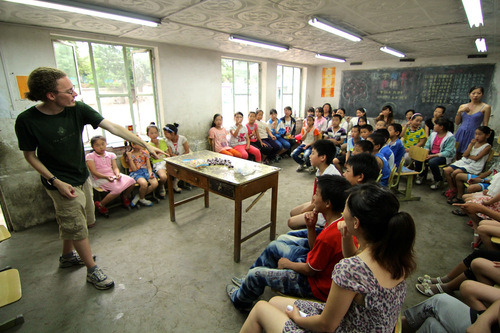
Sometime during the middle of the week it became clear that what the teachers were concerned with was the students passing standardized tests. From what I understood, it’s a bit more of a complicated issue there than in the States. I remember taking state testing when I was growing up, and the issues surrounding controversies where teachers would just teach what would be on the test. But there, the way for these kids to get into better secondary schools, high schools, universities, whatever, is to do well on these tests early on. So we looked at a copy of their textbook and tried to figure out how to adapt the system to work for that purpose, or at least supplement that purpose.
After looking through the book for a bit, David found that the students we were working with haven’t been introduced to the concept of “can” yet, so we decided to go for that. In the morning on Wednesday, we taught the kids “can” using WAYK, not translating, and they got it. The teachers then asked us to create a more advanced ride that none of the students were exposed to, (we were working with a range of kids from 3rd to 6th grade) and basically teach them how to get to a party, how to plan a party. So we got to throw a party.
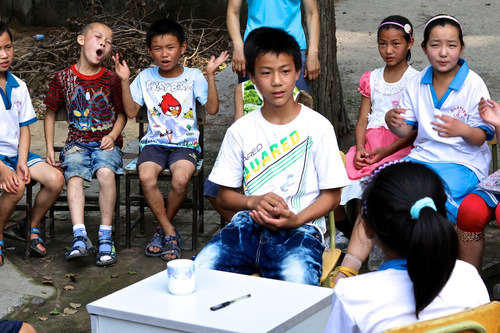
It’s a very difficult thing to teach concepts such as “where,” “when,” “who can do what,” “who can bring what,” to a group of kids in a day, but David did an excellent job and we planned our party with the students Wednesday afternoon and had our party Thursday afternoon. The time in between was getting everyone ready and taking part in doing something, with “what can you do at the party?” A group of kids wanted to play basketball, some wanted to sings, two wanted to dance and we asked Luofan (David said that’s the right way to spell Lo Fan’s name) to play guitar and he agreed.
It ended up raining on Thursday, so the kids couldn’t play basketball at the party, but the rest of it went well. There was candy and dancing and singing and guitar playing. Victory!
On Friday, our last day there the teachers treated us to some dumplings for lunch which were pretty damn good, but before that we got the chance to see two of the teachers apply the system to their curriculum. It was good to see them embrace it, and to use the techniques in the way they were teaching. Hopefully they use them more, and use the WAYK manual that David is writing.
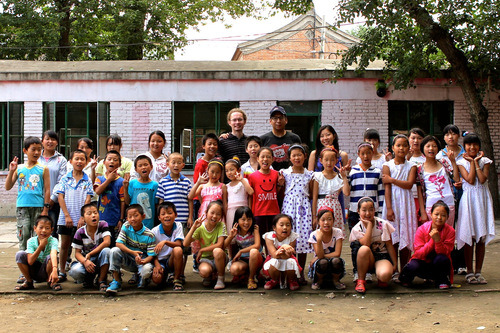
We weren’t exactly doing WAYK the way we would have liked to, but we managed to adapt the system enough to incorporate it into the program that the teachers were already using, which really is an important aspect of WAYK: adaptability. And we learned some very important things that we can hopefully refine into proper WAYK Techniques that we can begin teaching off. It really was a lot of fun at Chuanwei, the students were great, the teachers were excited for the method, and next we’ll continue to help them implement the method throughout the upcoming school year.
That evening we got in a bus and headed back into Beijing for a day of rest before we left for our next destination: Dalanzhen.

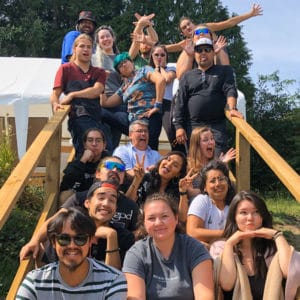
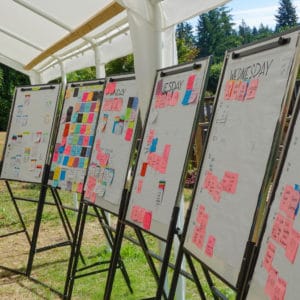
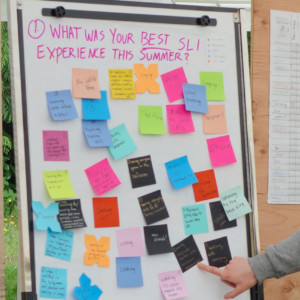
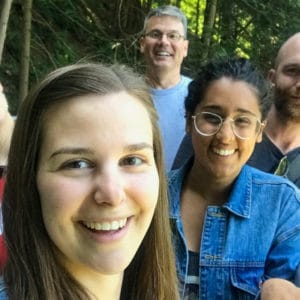
Thanks for the post guys!
I personally wouldn’t say they are good at reading and writing either. Mostly likely what happens is they learn things completely out of context and they don’t build on proper foundations like WAYK does.
Like you say, they learn to pass a test.